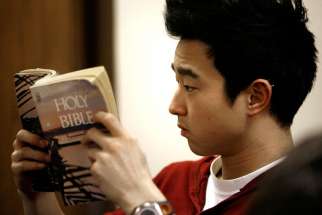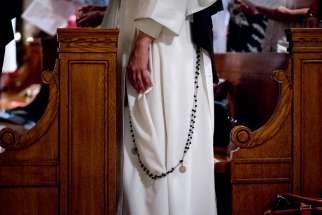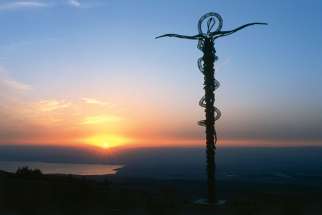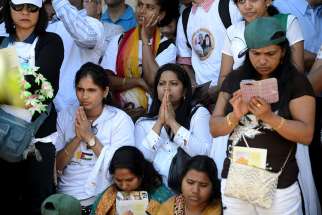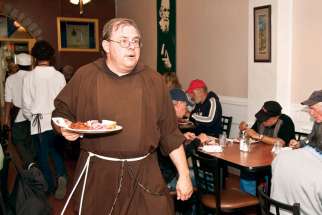Marvelous things happen with God
18th Sunday in Ordinary Time (Year A) Aug. 3 (Isaiah 55:1-3; Psalm 145; Romans 8:35, 37-39; Matthew 14:13-21)
Remember when pillows and blankets on airplanes were free and there was no charge for baggage? Those days are gone forever, and increasingly every dimension of daily life has charges and costs tied to them.
No shortcuts to God
17th Sunday in Ordinary Time (Year A) July 27 (1 Kings 3:5-12; Psalm 119; Romans 8:28-30; Matthew 13:44-52)
If we were granted one wish, what would we ask for? The answer to that question would say a lot about our character and personality.
God’s word is at work worldwide
15th Sunday in Ordinary Time (Year A) July 13 (Isaiah 55:10-11; Psalm 65; Romans 8:18-23; Matthew 13:1-23)
When is a word more than a word? We usually associate words with the squiggles on a page or a discrete unit of speech. In the case of the Scriptures this view can lead to narrow, overly literal and superficial understanding.
Live by the Spirit
14th Sunday in Ordinary Time (Year A) July 6 (Zechariah 9:9-10; Psalm 145; Romans 8:9, 11-13; Matthew 11:25-30)
Wouldn’t it be wonderful if a superhero arrived on the scene and put an end to the wars in Iraq, Syria and Afghanistan, as well as all acts of terrorism and violence?
The Kingdom’s keys belong to those who are faithful
Sts. Peter and Paul (Year A) June 29 (Acts 12:1-11; Psalm 34; 2 Timothy 4:6-8; 17-18; Matthew 16:13-19)
Dramatic prison breaks are featured in many novels and movies. Recently Canadians were shocked at a daring helicopter escape from a prison in Quebec. Peter, however, could top any of these stories. He was sprung from captivity by an angel!
How we deal with adversity reveals our commitment to God
Body and Blood of Christ (Year A) June 22 (Deuteronomy 8:2-3, 14-16; Psalm 147; 1 Corinthians 10:16-17; John 6:51-59)
Man does not live by bread alone, but by every word that comes from the mouth of God. If only it were true!
God’s compassion, mercy journey by our side
Trinity Sunday (Year A) June 15 (Exodus 34:4b-6, 8-9; Daniel 9; 2 Corinthians 13:11-13; John 3:16-18)
The people in the Bible perceived God in diverse and sometimes contradictory ways. Throughout the book of Exodus, the people of Israel alternated between resentment and complaint towards God on the one hand and sheer terror on the other. They complained bitterly to God continually out of their fear and lack of trust. But when Moses approached the mountain to encounter God, the people refused to go anywhere near it. They were quite content to send him in their place, and in fact Exodus referred to him as the one who spoke face to face with God as if to a friend.
‘One God, one world, one people’
Pentecost Sunday (Year A) June 8 (Acts 2:1-11; Psalm 104; 1 Corinthians 12:3b-7, 12-13; John 20:19-23)
People have many different understandings of the Holy Spirit. For some, it is a life-changing encounter with the divine, while for others it remains a distant and abstract theological formula. Even within the pages of the New Testament, the Holy Spirit is cloaked in differing forms and works in various ways.
True followers have Jesus’ guidance
Sixth Sunday of Easter (Year A) May 25 (Acts 8:5-8, 14-17; Psalm 66; 1 Peter 3:15-18; John 14:15-21)
The proclamation of the Gospel took hold in a very powerful way in Samaria. The Samaritans received the Word enthusiastically. Exorcisms, healings and miracles were the order of the day. This doesn’t make much of an impression on us now — we have heard it so many times, so what is the big deal?
Jesus is the way, the truth and the life
Fifth Sunday of Easter (Year A) May 18 (Acts 6:1-7; Psalm 33; 1 Peter 2:4-9; John 14:1-12)
Tension between various groups has been a fact of life in the Christian Church right from the beginning. Human nature is fairly constant.
God’s mercy allows us to repent
Fourth Sunday of Easter (Year A) May 11 (Acts 2:14a, 36b-41; Psalm 23; 1 Peter 2:20b-25; John 10:1-10)
Peter’s words rolled across the crowd like the voice of doom. They were thunderstruck at his message: somehow they had crucified the one whom God had designated as Lord and Messiah.
The divine will always involved pain, struggle
Third Sunday of Easter (Year A) May 4 (Acts 2:14, 22b-28; Psalm 16; 1 Peter 1:17-21; Luke 24:13-35)
There are two streams of history active in our world and they often work at cross-purposes. The first stream consists of human schemes and behaviour that are often the expression of desires, fears, jealousy and hatred. Even our best intentions are often fatally compromised by the presence of these tendencies. The world as we experience it is the unhappy result. The other stream is that of God’s will operating in history. It is relentless; even when temporarily diverted or blocked by human behaviour, it always triumphs in the end. God’s will is the redemption of all humanity and the transformation of the world.
Jesus offers no free pass
21st Sunday in Ordinary Time (Year C) Aug. 25 (Isaiah 66:18-21; Psalm 117; Hebrews 12:5-7, 11-13; Luke 13:22-30)
The concept of a universal God was not a New Testament invention. The vision of the inclusion of other peoples and nations in God’s plan of salvation was firmly embedded in the third portion of the Book of Isaiah. The sojourn in Babylon had stretched the intellectual and spiritual horizons of Israel’s people. They encountered other belief systems and cultures more directly than in the past. Even in foreign captivity they saw God at work and their release from captivity was a gift of Cyrus the new Persian ruler, designated God’s anointed in Isaiah.
God is love, God is light
Pentecost Sunday (Year C) May 19 (Acts 2:1-1; Psalm 104; 1 Corinthians 12:3-7, 12-13; John 20:19-23)
What actually happened at Pentecost? What would a video recorder have registered? The issue is clouded by the fact that we have two accounts in the New Testament and they are very different. The descent of the Spirit in Acts is rather noisy and flashy, and it results immediately in public proclamation of Jesus by the assembled disciples. The giving of the Spirit in John was a quiet, intimate affair in the upper room. Jesus bestowed the Spirit personally on His followers, but there was no record of an immediate public ministry.
God is love, God is light
Pentecost Sunday (Year C) May 19 (Acts 2:1-1; Psalm 104; 1 Corinthians 12:3-7, 12-13; John 20:19-23)
What actually happened at Pentecost? What would a video recorder have registered? The issue is clouded by the fact that we have two accounts in the New Testament and they are very different. The descent of the Spirit in Acts is rather noisy and flashy, and it results immediately in public proclamation of Jesus by the assembled disciples. The giving of the Spirit in John was a quiet, intimate affair in the upper room. Jesus bestowed the Spirit personally on His followers, but there was no record of an immediate public ministry.


